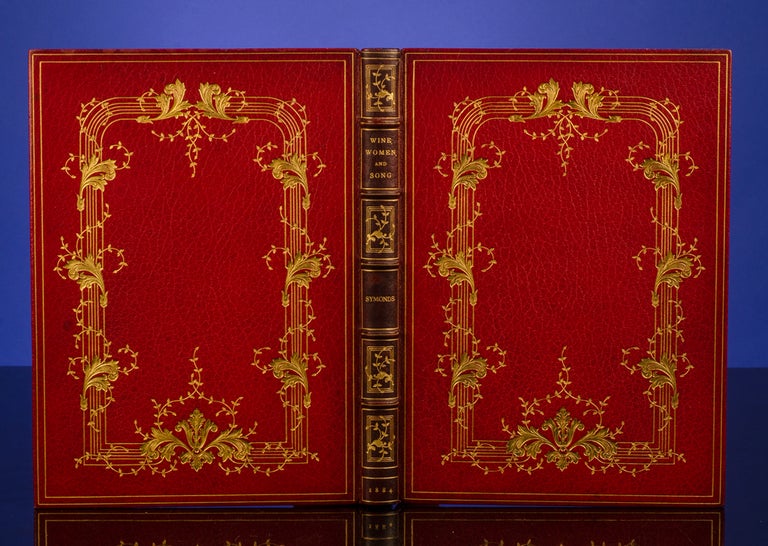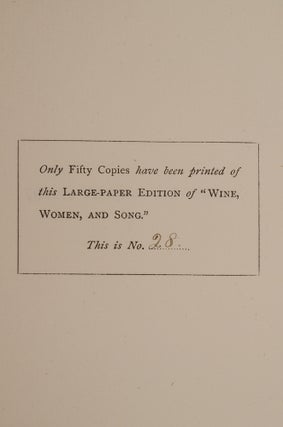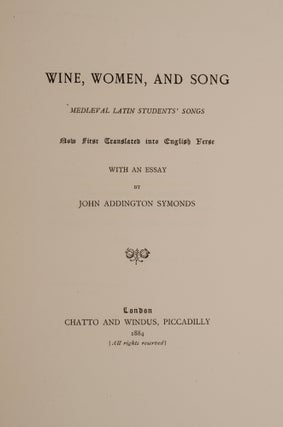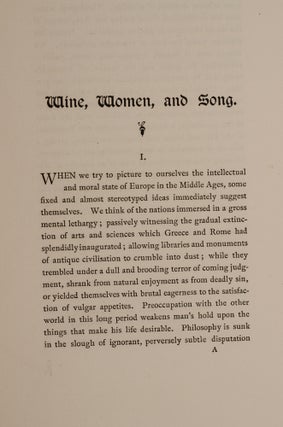Wine, Women, and Song
London: Chatto and Windus, 1884. Item #03270
"Wine, Women, and Song"
In a Fine, Near Contemporary 'Exhibition' Binding by Zaehnsdorf
[ZAEHNSDORF, binder]. SYMONDS, John Addington. Wine, Women, and Song. Mediaeval Latin Students' Songs. Now First Translated into English Verse. With an Essay by John Addington Symonds. London: Chatto and Windus, 1884.
First edition. One of Fifty Large-Paper Copies of which this is number 28.
Quarto (10 7/8 x 7 7/8 inches; 276 x 201 mm.). [viii], 184 pp.
Bound ca. 1900 by Zaehnsdorf in an 'Exhibition' binding of full red crushed levant morocco. Covers decoratively tooled in gilt with multi-line borders and floral decorations. Spine with five raised bands, decoratively tooled and lettered in gilt, gilt board edges and turn-ins, red silk liners and endpapers. With the small circular 'Exhibition' stamp in blind on rear turn-in. Slight darkening to spine, otherwise very fine.
This is the first edition of John Addington Symonds’ translations from the Carmina Burana, a Medieval Latin manuscript of 254 poems, songs and dramatic texts from the 11th-13th centuries, being the work of the Goliards, a group of clerical students from France, Germany Spain, Italy and England, who protested the growing contradictions within the Church and satirized it through song, poetry and dramatic performances. The original manuscript contains 55 songs of morals and mockery, 131 love songs and 40 drinking and gaming songs. Symonds’ selection is dedicated to Robert Louis Stevenson and is prefaced by an essay on Goliardic literature.
Carmina Burana is a scenic cantata composed by Carl Orff in 1935 and 1936, based on 24 poems from the medieval collection Carmina Burana. Its full Latin title is Carmina Burana: Cantiones profanæ cantoribus et choris cantandæ comitantibus instrumentis atque imaginibus magicis (Songs of Beuern: Secular songs for singers and choruses to be sung together with instruments and magic images). Carmina Burana is part of Trionfi, a musical triptych that also includes Catulli Carmina and Trionfo di Afrodite. The first and last movements of the piece are called "Fortuna Imperatrix Mundi" (Fortune, Empress of the World) and start with the very well known "O Fortuna".
John Addington Symonds (1840-1893) was an English poet and literary critic. Although he married and had a family, he was an early advocate of male love (homosexuality), which he believed could include pederastic as well as egalitarian relationships. He referred to it as l'amour de l'impossible (love of the impossible). A cultural historian, he was known for his work on the Renaissance, as well as numerous biographies about writers and artists. He also wrote much poetry inspired by his homosexual affairs.
Price: $2,950.00

 I have been in the rare and antiquarian book business for over forty years; my family has been in the rare books business since 1876. Rare books are in my blood.
I have been in the rare and antiquarian book business for over forty years; my family has been in the rare books business since 1876. Rare books are in my blood.



